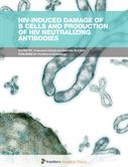Explore

HIV-Induced Damage of B Cells and Production of HIV Neutralizing Antibodies
Francesca Chiodi and Gabriella Scarlatti
2018
0 Ungluers have
Faved this Work
Login to Fave
Multiple dysfunctions take place in the B cell compartment during HIV-1 infection, comprising depletion of resting memory B cells carrying serological memory to vaccines and previously met pathogens. In addition, population of B cells characterized by the expression of exhaustion markers are enlarged during HIV-1 infection. Antibodies with the capacity to neutralize a broad range of HIV-1 isolates can be detected only in a minority of infected patients, after a year or more from acute infection. An open question is whether the inability of producing neutralizing HIV-1 antibodies is somehow linked to the B cell immunopathology observed in patients. In this research topic we invited scientists to summarize the current state of knowledge on regulation and development of B cells and antibody responses during HIV-1 infection; fifteen contributions were received comprising both reviews and original articles. The articles are related to B cell dysfunctions identified in HIV-1 infected individuals, production of different types of antibodies (neutralizing versus non neutralizing, and of different isotypes) in vivo during HIV-1 infection and the biological factors which may impact on this process, clinical potential and applications of anti-HIV antibodies and how to achieve neutralizing antibody responses to HIV-1 epitopes upon vaccination. The topic has gathered articles on front-line research undertaken in the field of B cells and antibodies in HIV-1 infection. It is our hope that the collection of articles presented in this book may be useful for new and experienced scholars in the field and add a piece to the complex puzzle of knowledge needed for the development of an HIV-1 vaccine.
This book is included in DOAB.
Why read this book? Have your say.
You must be logged in to comment.
